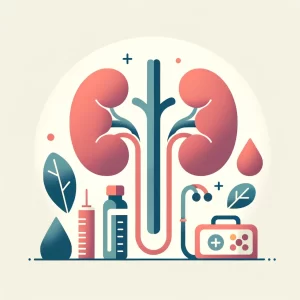Understanding the BUN Creatinine Ratio Test

The BUN Creatinine Ratio test is a critical health marker, providing insights into kidney function and overall health. This test measures the levels of blood urea nitrogen (BUN) and creatinine in your blood, offering a window into how well your kidneys are filtering waste from your blood.
Why is the BUN Creatinine Ratio Important?
In both conventional and functional medicine, the BUN Creatinine Ratio is a key indicator. For doctors, it helps in diagnosing and monitoring kidney diseases. In functional medicine, this ratio is crucial for a deeper understanding of your hydration status, kidney health, and even dietary choices.
Labs Included in Your Order
| Lab Test | Medical Reference Range | Interpretation of Low and High Levels |
|---|---|---|
| BUN | Based on age and sex | High: High BUN may indicate kidney dysfunction, dehydration, heart failure, gastrointestinal bleeding, or increased protein intake. Low: Low BUN can be due to malnutrition, severe liver damage, or overhydration. |
| Creatinine | Based on age and sex | High: High creatinine may suggest impaired kidney function or kidney disease, muscle diseases, or dehydration. Low: Low Creatine may be due to a low muscle mass, certain dietary factors, or severe liver disease. |
| eGFR (Glomerular Filtration Rate) | >60 mL/min/1.73m2 | eGFR is an indicator of how well fluid flows through your kidneys. High: High eGFR higher than normal eGFR is generally not a cause for concern. Low: Low eGFR- poor kidney function and can be a sign of kidney disease. |
| BUN/Creatinine Ratio | 10:1 to 20:1 | High: A high BUN/Creatinine ratio may suggest kidney-related diseases, congestive heart failure, urinary tract obstruction, or gastrointestinal bleeding when used with other tests. Low: A low BUN/Creatinine ratio may indicate conditions such as malnutrition, liver disease, sickle cell anemia, hypothyroidism, rhabdomyolysis (destruction of muscles), kidney damage or failure, or the effect of certain medications like acetazolamide on the kidneys. |
Reasons to Consider This Test
Regular monitoring of your BUN Creatinine Ratio can be a vital part of your health regimen. It’s particularly relevant if you have existing kidney issues, are on certain medications, or want a comprehensive view of your health. Understanding your ratio helps in making informed lifestyle and dietary decisions.
BUN Creatinine Ratio FAQ
What is the BUN Creatinine Ratio Test For?
The BUN Creatinine Ratio test is used to assess kidney function and hydration status, helping in the diagnosis and monitoring of kidney diseases and conditions affecting kidney function.
What Does Low and High Levels Mean?
High levels might indicate conditions like dehydration or kidney disease, while low levels could suggest malnutrition or liver issues.
What are the Signs and Symptoms?
Symptoms vary based on underlying causes but may include fatigue, changes in urination, swelling, and confusion.
How Often Should I Retest?
The frequency depends on individual health needs and doctor’s advice, typically during regular health check-ups or as recommended by a healthcare provider.
How Accurate is the Test?
This test is generally reliable for assessing kidney function but should be interpreted in conjunction with other medical information.
Are Test Results Private and Confidential?
Receive test results securely on TrueHealthLabs.com under ‘My Account.’ It’s critical that you share them with your physician. Results may be disclosed to health authorities only if legally mandated, e.g., for STDs or COVID-19. Review our privacy policy for more details.
To learn more, see our comprehensive guide to the BUN Creatinine Ratio test.
Medical Review Board
Reviewed by Jeff Donohue M.D. from Body Logic and Brady Hurst DC, CCCN. Written by True Health Lab’s team of editorial health contributors.
Disclaimer: This information is for educational purposes only and not intended as medical advice. Consult your healthcare provider for personalized guidance.
Why Customers Trust True Health Labs - What People are saying
Also rated 4.6 out of 5 based on 3452 ShopperApproved reviews- See all TrueHealthLabs.com reviews.





